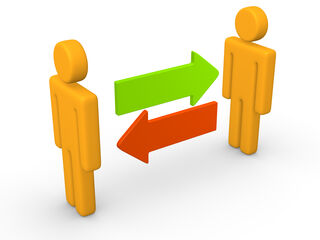Relationships
What Do You Evoke in Others (and They in You)?
The principle of reciprocity says we can influence how others treat us.
Posted December 24, 2020 Reviewed by Gary Drevitch

From holiday gift-giving to the Golden Rule, human beings have tried to influence each other’s positive behavior from the earliest of times: “Do unto others as you would have them do unto you.”
Most of the time we don’t think about how we inspire others to move closer to us or farther away. We assume that we just act the way we do, and others just act the way they do. But understanding the principle of reciprocity can help us decide which relationships to be in and how to manage them better.
What Goes Around Comes Around
One psychological definition of reciprocity states: “The principle of complementarity, or reciprocity, posits that an individual’s interpersonal behaviors tend to initiate and elicit interpersonal responses from his or her interaction partner that reinforce the individual’s original behaviors.”1 In other words, we tend to evoke responses in others which reinforce our own behavior, good and bad. We may like or dislike their responses, and think it has nothing to do with us. But it usually does. That’s reciprocity. This can include both positive reciprocity and negative reciprocity.
Positive Reciprocity
If someone gives you a gift or does you a favor, and then you give them a gift or favor of comparable value, that’s positive reciprocity. In negotiations, if you want the other side to give you a concession, then you must suggest a concession that you will give, often of similar value.
Reciprocity is the foundation of positive relationships because it makes them beneficial to both people and predictable. Positive reciprocity builds trust. Contracts, constitutions, and laws are based on this idea. Our friendships and romantic relationships are, too.
Negative Reciprocity
If you engage in a behavior that is considered negative toward your interaction partner, this will evoke a negative response back. With negative reciprocity, the response you get back will usually be of approximately equal value. If it's worse, then that’s not reciprocity and it will be frowned upon. That’s what social rules and laws are about. But what if the other person’s negative response is not at all what you expected? Or what if the other person repeatedly overreacts with negative behavior?
Some Cannot Reciprocate
People with high conflict personalities don’t engage in positive or negative reciprocity. They tend to have four primary characteristics:
- Preoccupation with blaming others.
- All-or-nothing thinking.
- Unmanaged emotions.
- Extreme behavior.
For these reasons, they cannot reciprocate positive comments and behavior, and their negative comments and behavior are way out of proportion.
High conflict people (HCPs) with narcissistic personality traits in particular cannot reciprocate positive efforts because they believe they are entitled to positive treatment and even admiration without any effort on their part. Those with borderline personality traits may reciprocate positive gestures, but minor negative behavior—even unintentional—may trigger an extremely negative response that's way out of proportion. HCPs with antisocial personality traits may actually treat positive behavior toward them as an opportunity for conning the other person. Of course, any negativity toward an antisocial person may trigger a disproportionate, possibly dangerous, negative response.
In the case of these high conflict personalities, it is unrealistic to expect positive reciprocity or even negative reciprocity. They treat all interactions and relationships as inherently adversarial and are willing to go into extreme behavior at any time. For this reason, it is unrealistic to expect to have a positive relationship once you realize that your positive initiatives are not being reciprocated or that your minor negative behavior (we all have some) is not reciprocated in a proportional negative way. Wishing that you will be reciprocated much later is not realistic. Reciprocity is usually offered in a timely manner.
Conclusion
By becoming more aware of what we evoke in others, we can become more effective at getting what we want in interactions with anyone. We can attract more people who will treat us the way we want and discourage people who will not. By recognizing what people evoke in us, we can make decisions about relationships earlier on. Positive reciprocity is the goal. We want to find people who can have that with us.
The questions we should ask ourselves from time to time are, “Am I evoking responses in others that are what I want? Am I contributing to positive reciprocity? If not, is there something I can do differently to make my part better? If not, does it mean that this other person is unable to give me what I want or need because of their own difficulties?” Greater awareness is the key to these answers.
I wish you positive reciprocity for the holidays.
References
1. Wilson S., Stroud, C. and Durbin, C. Interpersonal Dysfunction in Personality Disorders: A Meta-Analytic Review, Psychology Bulletin, July 2017; 143(7): 677-734. doi: 10.1037/bul0000101, 5.




